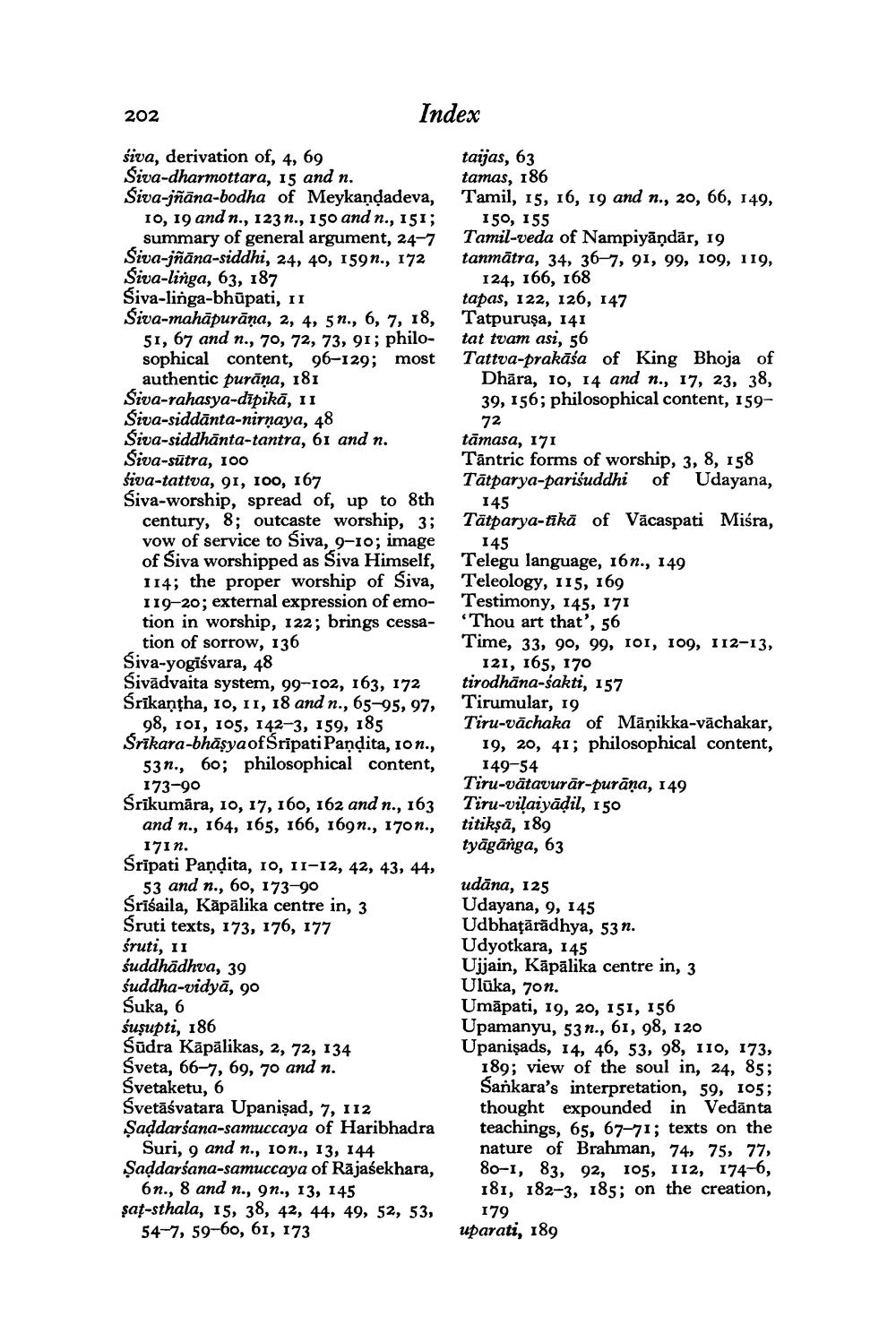________________
202
Index
taijas, 63 tamas, 186 Tamil, 15, 16, 19 and n., 20, 66, 149,
150, 155 Tamil-veda of Nampiyāņdār, 19 tanmātra, 34, 36-7, 91, 99, 109, 119,
124, 166, 168 tapas, 122, 126, 147 Tatpuruşa, 141 tat tvam asi, 56 Tattva-prakāśa of King Bhoja of Dhāra, 1o, 14 and n., 17, 23, 38, 39, 156; philosophical content, 159
72 tāmasa, 171 Tāntric forms of worship, 3, 8, 158 Tātparya-parisuddhi of Udayana,
145 Tātparya-tīkā of Vacaspati Misra,
145
siva, derivation of, 4, 69 Siva-dharmottara, 15 and n. Siva-jñāna-bodha of Meykaņdadeva,
10, 19 and n., 123 n., 150 and n., 151;
summary of general argument, 24-7 Siva-jñāna-siddhi, 24, 40, 1591., 172 Siva-linga, 63, 187 Siva-linga-bhūpati, II Siva-mahāpurāna, 2, 4, 5n., 6, 7, 18,
51, 67 and n., 70, 72, 73, 91; philo- sophical content, 96-129; most
authentic purāņa, 181 Siva-rahasya-dīpikā, II Siva-siddānta-nirnaya, 48 Siva-siddhānta-tantra, 61 and n. Siva-sūtra, 100 siva-tattva, 91, 100, 167 Siva-worship, spread of, up to 8th
century, 8; outcaste worship, 3; vow of service to Siva, 9-10; image of Siva worshipped as Siva Himself, 114; the proper worship of Siva, 119-20; external expression of emo- tion in worship, 122; brings cessa
tion of sorrow, 136 Siva-yogiśvara, 48 Sivādvaita system, 99-102, 163, 172 Śrīkantha, 10, 11, 18 and n., 65-95, 97,
98, 101, 105, 142–3, 159, 185 Srikara-bhāşyaof Sripati Pandita, ion.,
53n., 60; philosophical content,
173-90 Śrīkumāra, 10, 17, 160, 162 and n., 163
and n., 164, 165, 166, 169n., 170n.,
17ın. Śrīpati Pandita, 10, 11-12, 42, 43, 44,
53 and n., 60, 173-90 Srisaila, Kāpālika centre in, 3 Sruti texts, 173, 176, 177 śruti, 11 śuddhādhva, 39 suddha-vidyā, 90 Suka, 6 śuşupti, 186 Sūdra Kāpalikas, 2, 72, 134 Sveta, 66–7, 69, 70 and n. Svetaketu, 6 Svetāśvatara Upanişad, 7, 112 Şaddarśana-samuccaya of Haribhadra
Suri, 9 and n., 10n., 13, 144 Şaddarśana-samuccaya of Rājasekhara,
6n., 8 and n., 9n., 13, 145 şat-sthala, 15, 38, 42, 44, 49, 52, 53,
54-7, 59-60, 61, 173
Telegu language, 16n., 149 Teleology, 115, 169 Testimony, 145, 171 Thou art that', 56 Time, 33, 90, 99, 101, 109, 112-13,
121, 165, 170 tirodhāna-sakti, 157 Tirumular, 19 Tiru-vāchaka of Māņikka-vāchakar,
19, 20, 41; philosophical content,
149-54 Tiru-vātavurār-purāņa, 149 Tiru-viļaiyādil, 150 titikṣā, 189 tyāgānga, 63
udāna, 125 Udayana, 9, 145 Udbhațārādhya, 53 n. Udyotkara, 145 Ujjain, Kāpālika centre in, 3 Ulūka, 70n. Umāpati, 19, 20, 151, 156 Upamanyu, 53 n., 61, 98, 120 Upanişads, 14, 46, 53, 98, 110, 173,
189; view of the soul in, 24, 85; Sankara's interpretation, 59, 105; thought expounded in Vedānta teachings, 65, 67-71; texts on the nature of Brahman, 74, 75, 77, 80-1, 83, 92, 105, 112, 174-6, 181, 182–3, 185; on the creation,
179 uparati, 189




